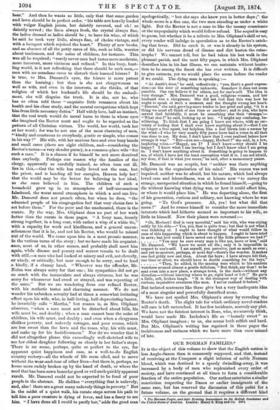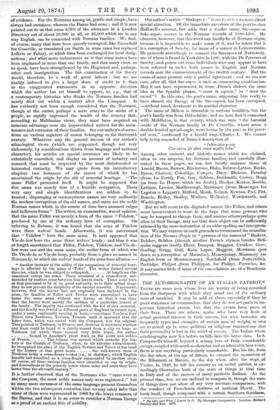OUR NORMAN FAMILIES.* IT is the object of this volume
to slow that the English nation is less Anglo-Saxon than is commonly supposed, and that, instead of receiving at the Conquest a slight infusion of noble Norman blood, which was destined to a speedy dwindling-away, it was increased by a body of men who replenished every order of society, and have continued at all times to form a considerable fraction of the entire population. Our author, entertains a similar conviction respecting the Danes or earlier immigrants of the same race, but has reserved the discussion of this point for a future volume, on the ground that it requires a different kind
* The Norman People, and their Existing Descendants in the British Dominions and the United States of America. London: Henry S. King and Co. 1874.
of evidence. For the Normans among us, gentle and simple, have always had surnames, whereas the Danes had none ; and it is now pointed out to as that some 6,900 of the surnames in a London Directory out of about 29,000 in all, or 26,000 which are in any way English, can be connected with Norman families. We find, of course, many that have been queerly corrupted, like Greenfield for Granville, or translated (as Smith in some cases has replaced Lefevre or Faber), or which have lieen exchanged for local desig- nations; and what more embarrasses us is that some names have been originated in more than one family, and that many clans, so to speak, have been strengthened by the Huguenot and, perhaps, other such immigrations. The fair examination of the theory would, therefore, be a work of great labour ; but we are readily induced to give a larger share of credit to it than to the exaggerated statements in an opposite direction which the author has set himself to oppose, as, e.g., that of A contemporary historian who thinks the Norman families had nearly died out within a century after the Conquest. It has evidently not been enough considered that the Normans, though at the outset, perhaps a mere army in the midst of a people, so rapidly engrossed the wealth of the country that, according to Malthusian views, they must have acquired an immense advantage over the impoverished natives for the main- tenance and extension of their families. See our author's observa- tions on various registers of names belonging to the thirteenth century. Whatever may the general success of our author's ethnological views (which are supported, though not very -elaborately, by considerations drawn from language and national character), his articles on special surnames are likely to be extensively consulted, and display an amount of industry and research that must be respected by *the most disinterested or interested curiosity. We may quote from his introductory chapters two instances of the names of which he has ascertained the origin by the aid of armorial bearings. "The name Fidler presented itself. It might be supposed that this name was merely that of a humble occupation. These very easy and simple identifications are seldom to be trusted ; disparaging or contemptuous names are very ordinarily the modern corruptions of the old names, and many are the noble Norman names which in the course of time have assumed vulgar and ludicrous forms." The writer, on examination, was of opinion, that the name Fidler was merely a form of the name "Fidelow," produced by one of the ordinary laws of corruption. On referring to Robson, it was found that the arms of Fidelow were three wolves' heads. Afterwards, it was ascertained -that " Videlow " bore the same arms. It next appeared that Vis-de-low bore the same three wolves' heads ; and thus it was at length ascertained that Fidler, Fidelow, Videlow, and Via-de- l:ow were one and the same name, the earlier form of which was IDe Via-de-lu or Vis-de-loup, probably from a place so named in 1TormandY, to which the wolves' heads of the arms bore allusion :— " Another instance of the utility of the comparison of armorial bear- ings is afforded by the name of Toler.' The writer formed several theories, which he was obliged to relinquish. At length no clue remained except the arms. These consisted of a cross-floury, sur- mounted by another cross between four leaves erect. These arms were at first presumed to be of no great antiquity, as in their actual shape they do not present the eimplicity of the ancient armorial. It appeared, however, that the leaves had not originally been included in the arms, for families of Teller and Towler were ascertained to have borne the same arms without any leaves, so that it was clear that the leaves were merely the emblem of a particular branch of the family. The inquiry was continued with the aid of this armorial, and the family was traced in different parts of England in former ages, under a name continually varying in form,—somotimes Towlers, then 'Tolers' then Towlowee, Towlors, Tolonse, until it appeared that the latter form, which was coeval with the Conquest, was the original. This pointed to Toulouse' in France, and desirous to ascertain whether any trace could be found of a family named from a city so large as Toulouse (of which there seemed very little hope), the author turned to Anselme's great work on the peers and nobles
of France The volume was opened which contains the his- tory of the Counts of Toulouse, when, to his extreme astonishment, he recognised the arms of the English Towlers and Tolers at the head
of the history of that great house the well-known cross of Toulouse being a cross-fleury voided (i.e. in skeleton), which! English heralds had described as a cross-floury surmounted by another cross. -Of course, all these various families were identified as one in origin, and descendants of the princely house whose name and arms they have borne from the eleventh century."
It is further observed that of the Normans who "came over at the Conquest, the most noble names only were registered ;" but so many more surnames of the same language present themselves within the two subsequent centuries, that we may safely infer that many of them were represented in 1066 by the lower retainers of the Barons, and that it is an error to consider a Norman lineage 0 • Ifs Life, and 1Vhat I Learnt in IL as a proof of an ancient title of nobility. Bentley and Son. 1874. Our author's article " Shakspeare "is one to wl,ih we must direct special attention. Of the immediate ancestors of the poet he cites Halliwell's account, but adds that a similar name, Sac-eapee or Sake-espee, occurs in the Norman records of 1180-1200. He observes, however, that this word can hardly be of Norman origin, because it is impossible to make sense of it, and he infers that it ls'a corruption of Saxeby, the name of a manor in Leicestershire. He proceeds accordingly to connect the Sacespees of Normandy, one of whom is found in Yorkshire in 1280, with the De Pererses of SarebY, and points out some individuals who may appear to have been referred to under both names in English and Norman records near the commencement of the twelfth century. But the coats-of-arms present only a partial agreement ; and we are not sure, after all, that Sac-espee is such an unmeaning combination. May it not have represented, in some French dialect, the same idea as the Spanish phrase, " sacar la espada," to "draw the sword "? In this case, the poet's name, supposing him really to have shared the lineage of the Sac-espees, has been corrupted, —without much detriment to its martial character.
The name of Wilton is traceable to various localities, but the poet's family was from Oxfordshire, and we here find it connected with Middleton, in that county, which was once "the baronial estate of the Norman family of De Camville, whose arras, a double-headed spread-eagle, were borne by the poet as his pater- nal coat," confirmed by a herald temp. Charles L We cannot help being reminded of Dante's description of
" l'altissimo poeta
Cho WITS gli altri come mails vela."
Among other eminent and historic names which are claimed, often to our surprise, for Norman families, and carefully illus- trated in these pages, we can but briefly instance those of Arnold, Bacon, Barrow, Blackstone, Blake, Bulwer-Lytton, Burke, Byron, Chaucer, Coleridge, Cowper, Davy, Dickens, Faraday (from La Ferte), Fox, Gay, Gibbon, Goldsmith, Gower, Hogg (as from La Hogue, which we doubt), Hooker, Kea.tes, Keeble, Latimer, Landor, Marlborough, Massinger (from Messenger, for Legatus = Leggatt), Mitford, Monk, Nelson, Newton, Peel, Pitt, Rennie, Ridley, Shelley, Wallace, Wellesley, Wordsworth, and Washington.
But we will recur to the degraded names, like Fidler, and others more inconvenient to wear, in the hope that some persons who may be tempted to change them, and assume others perhaps quite alien to their lineage, may see that their object can be sufficiently attained by the mere restoration of an older spelling and interpreta- tion. We may venture on such grounds to recommend the consulta- tion of the Norman People to "persons of the names of" Baskett, Belcher, Belshes (though another French etymon besides Bell- assize suggests itself), Blunt, Buinpus, Bugging, Croaker, Gore, Gosling, Grigg, Gull, Kain, Leper, Maggott, Merriman (put down as a corruption of Marmion), Moneypenny, Mummery (am English form of Montmorency), Nettlefield (from Netterville), Partridge, Philpot (from Philippa, for Philip), Portwine, &c. It may matter. little if some of the emendations are of a Bentleyan character.































 Previous page
Previous page